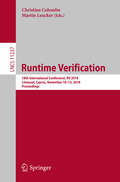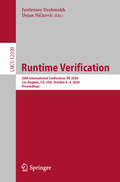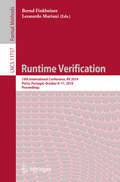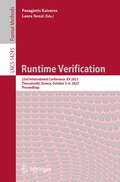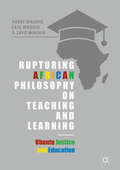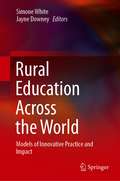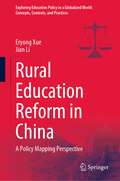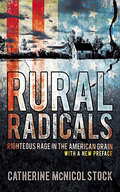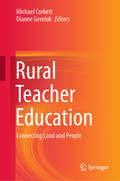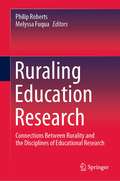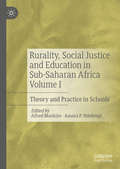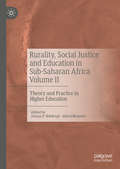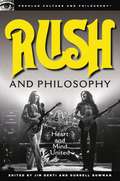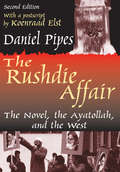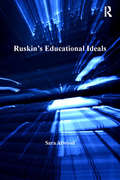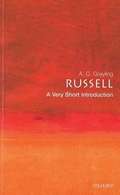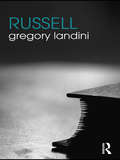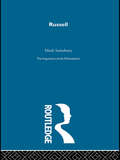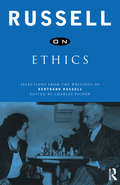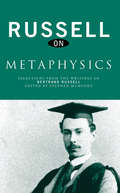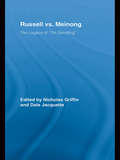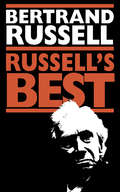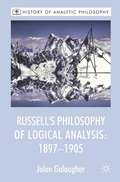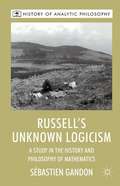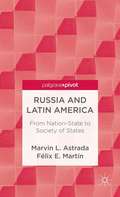- Table View
- List View
Runtime Verification: 18th International Conference, RV 2018, Limassol, Cyprus, November 10–13, 2018, Proceedings (Lecture Notes in Computer Science #11237)
by Christian Colombo Martin LeuckerThis book constitutes the refereed proceedings of the 18th International Conference on Runtime Verification, RV 2018, held in Limassol, Cyprus, in November 2018. The 21 full papers presented together with 3 short papers and 3 tool papers were carefully reviewed and selected from 49 submissions. The RV conference is concerned with all aspects of monitoring and analysis of hardware, software and more general system executions. Runtime verification techniques are lightweight techniques to assess correctness, reliability, and robustness; these techniques are significantly more powerful and versatile than conventional testing, and more practical than exhaustive formal verification.Chapter “Hardware-based Runtime Verification with Embedded Tracing Units and Stream Processing” is available open access under a Creative Commons Attribution 4.0 International License via link.springer.com.
Runtime Verification: 20th International Conference, RV 2020, Los Angeles, CA, USA, October 6–9, 2020, Proceedings (Lecture Notes in Computer Science #12399)
by Jyotirmoy Deshmukh Dejan NičkovićThis book constitutes the refereed proceedings of the 20th International Conference on Runtime Verification, RV 2020, held in Los Angeles, CA, USA, in October 2020. The conference was held virtually due to the COVID-19 pandemic. The 14 regular papers and 2 short papers presented in this book were carefully reviewed and selected from 43 submissions. Also included are an invited paper, 5 tutorial papers, 6 tool papers, and a benchmark paper. The RV conference is concerned with all aspects of monitoring and analysis of hardware, software and more general system executions. The papers are organized in the following topical sections: runtime verification for autonomy; runtime verification for software; runtime verification with temporal logic specifications; stream-based monitoring; and runtime verification for cyber-physical systems.
Runtime Verification: 19th International Conference, RV 2019, Porto, Portugal, October 8–11, 2019, Proceedings (Lecture Notes in Computer Science #11757)
by Bernd Finkbeiner Leonardo MarianiThis book constitutes the refereed proceedings of the 19th International Conference on Runtime Verification, RV 2019, held in Porto, Portugal, in October 2019.The 25 regular papers presented in this book were carefully reviewed and selected from 38 submissions.The RV conference is concerned with all aspects of monitoring and analysis of hardware, software and more general system executions. Runtime verification techniques are lightweight techniques to assess system correctness, reliability, and robustness; these techniques are significantly more powerful and versatile than conventional testing, and more practical than exhaustive formal verification.Chapter “Assumption-Based Runtime Verification with Partial Observability and Resets” and chapter “NuRV: a nuXmv Extension for Runtime Verification“ are available open access under a Creative Commons Attribution 4.0 International License via link.springer.com.
Runtime Verification: 23rd International Conference, RV 2023, Thessaloniki, Greece, October 3–6, 2023, Proceedings (Lecture Notes in Computer Science #14245)
by Panagiotis Katsaros Laura NenziThis book constitutes the refereed proceedings of the 23rd International Conference on Runtime Verification, RV 2023, held in Thessaloniki, Greece, during October 3–6, 2023. The 13 full papers and 7 short papers presented in this book together with 4 tutorial papers and 2 invited papers were carefully reviewed and selected from 39 submissions. The RV conference is concerned with all aspects of novel lightweight formal methods to monitor, analyze, and guide the runtime behavior of software and hardware systems. Runtime verification techniques are crucial for system correctness, reliability, and robustness; they provide an additional level of rigor and effectiveness compared to conventional testing and are generally more practical than exhaustive formal verification.
Rupturing African Philosophy on Teaching and Learning: Ubuntu Justice And Education
by Yusef Waghid Faiq Waghid Zayd WaghidThis book examines African philosophy of education and the enactment of ubuntu justice through a massive open online course on Teaching for Change. The authors argue that such pedagogic encounters have the potential to stimulate just and democratic human relations: encounters that are critical, deliberate, reflective and compassionate could enable just and democratic human relations to flourish, thus inducing decolonisation and decoloniality. Exploring arguments for imaginative and tolerant pedagogic encounters that could help cultivate an African university where educators and students can engender morally and politically responsible pedagogical actions, the authors offer pathways for thinking more imaginatively about higher education in a globalised African context. This work will be of value for researchers and students of philosophy of education, higher education and democratic citizenship education.
Rural Education Across the World: Models of Innovative Practice and Impact
by Simone White Jayne DowneyThis book brings together authors from United States, South Africa, United Kingdom, China, Canada and Australia to provide insights and case studies from across a range of contexts to explore the interplay between the notions of rurality, innovation and education. The book reveals a hopeful and resilient approach to innovative rural education and scholarship collectively and provides important evidence to speak against an often deficit view of rural education. Three patterns are revealed, namely: the importance of place-attentive strategies, the importance of joined up alliances to maximise resources and networks and finally, the need to utilize alternative methodologies and frameworks that have a starting point of difference rather than deficit for any rural initiative or approach. By drawing from international examples and responding in innovative ways to rural education challenges, this book provides an opportunity to share international insights into innovations, interventions and partnerships that promote and support rural education in its broadest sense.
Rural Education Reform in China: A Policy Mapping Perspective (Exploring Education Policy in a Globalized World: Concepts, Contexts, and Practices)
by Eryong Xue Jian LiThis book contextually explores the rural education reform in China from a policy mapping perspective. It discusses a wide range of topics in the context of China's rural areas, including rural school layout adjustment, rural teacher development, rural students' all-round education development, vocational education in rural areas, and rural education informatization development. With the challenges outlined and recommendations provided, the chapters offer a holistic view on China’s rural education reform. This book serves as a guide for scholars and researchers who are interested and work in research on China’s rural education reform, administrators, and stakeholders in China's education system and graduate students who major or minor in the field of rural educational policy.
Rural Radicals: Righteous Rage in the American Grain
by Catherine McNicol StockThrough its history, populism has meant hope and progress, as well as hate and a desire to turn back the clock on American history. In her new preface, Catherine McNicol Stock provides an update and overview of the conservative face of rural America. She paints a comprehensive portrait of a long line of rural activists whose crusades against big government, bug business, and big banks sometimes spoke in a language of progressive populism and sometimes in a language of hate and bigotry. Rural Radicals breaks down the populism expressed by activists, confronts our conventional notions of right and left, and allows us to understand political factionalism differently.
Rural Teacher Education: Connecting Land and People
by Michael Corbett Dianne GerelukThis book examines challenges associated with the education of teachers in and for rural places. It offers a new perspective with respect to how Canadian educators are shifting the conversation toward a hopeful discourse concerning how educators can foster meaningful rural learning environments, which will contribute to building stronger rural communities and regions. A central focus of the book is emerging reconceptualization of education, place and indigeneity in Canadian education in the wake of the Truth and Reconciliation CommissionThough the challenge of addressing rural teaching and learning lies partly in the nuances and complexities of unique places, there are also common threads that affect virtually all communities in rural, regional and remote educational, cultural, economic, and social geographies. Chapters in this collection provide current research in Canadian rural education including examples and stories from the field – contributed by teachers, administrators, and superintendents – on the challenges and creative opportunities that they have discovered in their own rural context, giving hope and inspiration for what is possible. The book will appeal to all readers interested in rural education and teacher education, as well as to those concerned with educational inequality and indigenous education.
Ruraling Education Research: Connections Between Rurality and the Disciplines of Educational Research
by Philip Roberts Melyssa FuquaThis edited volume brings together a collection of chapters from leading scholars in rural education with the purpose of linking knowledge from the rural education field to the wider discipline of education studies. Through addressing significant issues in the rural education field, the book gives insights from rural education that have general relevance for the wider disciplines of education, and provides up-to-date scholarship in research in rural contexts.This book aims to be a definitive and comprehensive edition of contemporary rural education scholarship that works as a guide for those new to researching in and for rural contexts, as well as actively expand the other sub-fields of education from a rural perspective. It examines the connection between rurality and the other domains of educational research, exploring what a rural perspective might bring to the broader fields of educational research, and how it might evolve them. In its unique approach, this book brings the concept of ‘rural’ to the disciplines of education; chapters regarding the ethics of research in the rural context speaks to a gap in rural education, and provide tools for engaging marginalised communities more generally in educational research.
Rurality, Social Justice and Education in Sub-Saharan Africa Volume I: Theory and Practice in Schools
by Alfred Masinire Amasa P. NdofirepiThis book explores rurality and education in sub-Saharan Africa through a lens of social justice. The first in a two-volume project, this book explores the possibilities and constraints of rural social justice in diverse educational contexts: how should rurality be defined? How does education shape and reshape what it means to be rural? Drawing chapters from a diverse range of contributors in sub-Saharan Africa, the two volumes are underpinned by a robust social justice approach to rural schooling and its intersections with access, gender, colonialism, social mobility and dis/ability. Ultimately, these volumes reflect the need to shift conceptions of rurality from colonial and conservative stereotypes to an appreciation of rurality as locations in space and time, with their own unique attributes and opportunities. Harnessing indigenous African concepts of justice to open up conversations into teaching and knowledge production in higher education, this book will be of interest to scholars of rurality and education, as well as wider discussions on decolonising the academy.
Rurality, Social Justice and Education in Sub-Saharan Africa Volume II: Theory and Practice in Higher Education
by Amasa P. Ndofirepi Alfred MasinireThis book explores rurality and education in sub-Saharan Africa through a lens of social justice. The second volume of a two-volume project, this book explores possibilities and constraints of rural social justice in diverse educational contexts, with particular emphasis on higher education. Drawing on contexts from across sub-Saharan Africa, this volume examines such topics as student-teacher preparation, post-colonialism and access and participation. In doing so, these volumes reflect the need to shift conceptions of rurality from colonial and conservative stereotypes to an appreciation of rurality as locations in space and time. Focusing on inclusivity and intersectionality, these books raise important questions into rurality and social justice, and champion openness for education in rural communities who may be excluded.
Rush and Philosophy
by Durrell Bowman Jim BertiThe progressive/hard rock band Rush has never been as popular as it is now. A documentary film about the band, Rush: Beyond the Lighted Stage, which was released in the summer of 2010 has been universally well received. They had a cameo in the movie I Love You Man. Their seven-part song "2112" was included in a version of "Guitar Hero" released in 2010. The group even appeared on The Colbert Report.Even legendary trios such as Led Zeppelin, Cream, and The Police don't enjoy the commitment and devotion that Rush's fans lavish on Alex, Geddy, and Neil. In part, this is because Rush is equally devoted to its fans. Since their first album in 1974, they have released 18 additional albums and toured the world following nearly every release. Today, when other 70s-bands have either broken up or become nostalgia acts, Rush continues to sell out arenas and amphitheatres and sell albums-to date Rush has sold over 40 million albums. They are ranked fourth after The Beatles, The Rolling Stones, and Aerosmith for the most consecutive gold or platinum albums by a rock band.Rush's success is also due to its intellectual approach to music and sound. The concept album 2112 made Rush a world-class band and cemented its reputation as the thinking-person's progressive rock trio. Rush's interest in political philosophy, mind-control, the nature of free-will, of individuality, and our relationship to machines makes Rush a band that matters and which speaks to its fans directly and honestly like no other. Lyricist Niel Peart has even built a following by writing books, both about his motorcycle travels and about the tragic death of his daughter, which have only furthered the respect Rush's fans have for (arguably) rock's greatest drummer and lyricist.Fiercely independent of trends, Rush has maintained a clear mission and purpose throughout their career. With the unique "Rush sound," the band has been able to blend thought-provoking lyrics and music for almost four decades. The Rush style of music can trigger the unusual combination of air-drumming, air-guitar, singing along, and fist-pumping, just as much as it can thoughtful reflection and deep thinking, making Rush "The Thinking Man's Band." Rush and Philosophy does not set out to sway the public's opinion, nor is it an awkward gushing of how much the authors love Rush. Rush and Philosophy is a fascinating look at the music and lyrics of the band, setting out to address thought-provoking questions. For example, elements of philosophical thinking from the likes of Jean Paul-Sartre, Ayn Rand, and Plato can be found in Peart's lyrics; does this make Peart a disciple of philosophy? In what ways has technology influenced the band through the decades? Can there be too much technology for a power-trio? Can listening to Rush's music and lyrics lead listeners to think more clearly, responsibly, and happily? Is the band's music a "pleasant distraction" from the singing of Geddy Lee? In what ways is Rush Canadian? How can a band that has been referred to as "right-wing" also criticize big government, religion, and imperialism? Rush and Philosophy is written by an assortment of philosophers and scholars with eclectic and diverse backgrounds who love Rush's music and who "get" the meaning and importance of it. They discuss Rush with the enthusiasm of fan. The book will be a must-read for the many fans who have long known that Rush deserves as much respect as the ideas, concepts, and puzzles about human existence they write and compose music about.
The Rushdie Affair: The Novel, the Ayatollah and the West
by Daniel PipesThe publication in 1988 of Salman Rushdie's novel The Satanic Verses triggered a furor that pitted much of the Islamic world against the West over issues of blasphemy and freedom of expression. The controversy soon took on the aspect of a confrontation of civilizations, provoking powerful emotions on a global level. It involved censorship, protests, riots, a break in diplomatic relations, culminating in the notorious Iranian edict calling for the death of the novelist. In The Rushdie Affair, Daniel Pipes explains why the publication of The Satanic Verses became a cataclysmic event with far-reaching political and social consequences.Pipes looks at the Rushdie affair in both its political and cultural aspects and shows in considerable detail what the fundamentalists perceived as so offensive in The Satanic Verses as against what Rushdie's novel actually said. Pipes explains how the book created a new crisis between Iran and the West at the time--disrupting international diplomacy, billions of dollars in trade, and prospects for the release of Western hostages in Lebanon.Pipes maps out the long-term implications of the crisis. If the Ayatollah so easily intimidated the West, can others do the same? Can millions of fundamentalist Muslims now living in the United States and Europe possibly be assimilated into a culture so alien to them? Insightful and brilliantly written, this volume provides a full understanding of one of the most significant events in recent years. Koenraad Elst's postscript reviews the enduring impact of the Rushdie affair.
Ruskin's Educational Ideals
by Sara AtwoodFocusing on John Ruskin as a teacher and on his greatest educational work, Fors Clavigera, Sara Atwood examines Ruskin's varied roles in education, the development of his teaching philosophy and style, and his vision for educational reform. Atwood maintains that the letters of Fors Clavigera constitute not only a treatise on education but a dynamic educational experiment, serving to set forth Ruskin's ideas about education while simultaneously educating his readers according to those very ideas. Closely examining Ruskin's life and writings, her argument traces the development of his moral aesthetic and increasing involvement in social reform; his methods and approach as an art instructor; and his dissatisfaction with contemporary educational practice. A chapter on Ruskin's legacy takes account of his influence on late Victorian and Edwardian educators, including J. H. Whitehouse and the Bembridge School; the Ruskin colonies in Tennessee, Florida, and Georgia; and the relevance of Ruskin's ideas to ongoing educational debates about teacher pay, state/national testing, retention, and the theory of the competent child. Historically well-grounded and forcefully argued, Atwood's study is not only a valuable contribution to scholarship on Ruskin and the Victorian period but an enjoinder for us to reconsider how Ruskin's educational philosophy might be of benefit today.
Russell: A Very Short Introduction
by A. C. GraylingBertrand Russell (1872-1970) is one of the most famous and important philosophers of the twentieth century. In this account of his life and work A.C. Grayling introduces both his technical contributions to logic and philosophy, and his wide-ranging views on education, politics, war, and sexual morality. Russell is credited with being one of the prime movers of Analytic Philosophy, and with having played a part in the revolution in social attitudes witnessed throughout the twentieth-century world. This introduction gives a clear survey of Russell's achievements across their wholerange.
Russell: Mathematics, Logic, Philosophy (The Routledge Philosophers #6)
by Gregory LandiniBertrand Russell (1872–1970) was renowned as one of the founding figures of "analytic" philosophy, and for his lasting contributions to the study of logic, philosophy of language, philosophy of mathematics and epistemology. He was also famous for his popular works, where his humanism, ethics and antipathy towards religion came through in books such as The Problems of Philosophy, Why I am Not A Christian, and The Conquest of Happiness. Beginning with an overview of Russell’s life and work, Gregory Landini carefully explains Russell’s philosophy, to show why he ranks as one of the giants of British and Twentieth century philosophy. He discusses Russell’s major early works in philosophy of mathematics, including The Principles of Mathematics, wherein Russell illuminated and developed the ideas of Gottlob Frege; and the monumental three volume work written with Alfred North Whitehead, Principia Mathematica, where the authors attempted to show that all mathematical theory is part of logic, understood as a science of structure. Landini discusses the second edition of Principia Mathematica, to show Russell’s intellectual relationship with Wittgenstein and Ramsey. He discusses Russell’s epistemology and neutral monism before concluding with a discussion on Russell’s ethics, and the relationship between science and religion. Featuring a chronology and a glossary of terms, as well as suggestions for further reading at the end of each chapter, Russell is essential reading for anyone studying philosophy, and is an ideal guidebook for those coming to Russell for the first time.
Russell-Arg Philosophers (Arguments Of The Philosophers Ser.)
by R.M. SainsburyFirst Published in 1999. Routledge is an imprint of Taylor & Francis, an informa company.
Russell on Ethics: Selections from the Writings of Bertrand Russell (Russell on...)
by Bertrand RussellRussell on Ethics presents a coherent and comprehensive collection of Russell's ethical writings, drawing on a wide range of his publications on ethical concerns, many of which have been difficult to access by students and general readers. Charles Pigden provides an accessible introduction to the papers, situating them within the field of ethics as a whole and detailed annotations on the papers themselves, analysing their arguments and exploring their relevance to current concerns. Russell on Ethics represents a valuable insight into Russell as an ethicist, which will be useful to both specialist and non-specialist alike.
Russell on Metaphysics: Selections from the Writings of Bertrand Russell (Russell on...)
by Bertrand Russell Stephen MumfordIs the world of appearances the real world?Are there facts that exist independently of our minds?Are there vague objects?Russell on Metaphysics brings together for the first time a comprehensive selection of Russell's writing on metaphysics in one volume. Russell's major and lasting contribution to metaphysics has been hugely influential and his insights have led to the establishment of analytic philosophy as a dominant stream in philosophy. Stephen Mumford chronicles the metaphysical nature of these insights through accessible introductions to the texts, setting them in context and understanding their continued importance. Russell on Metaphysics is both a valuable introduction to Bertrand Russell as a metaphysician, and an introduction to analytic philosophy and its history.
Russell vs. Meinong: The Legacy of "On Denoting" (Routledge Studies in Twentieth-Century Philosophy)
by Nicholas Griffin Dale JacquetteA century after ‘On Denoting’ was published, the debate it initiated continues to rage. On the one hand, there is a mass of new historical scholarship, about both Russell and Meinong, which has not circulated very far beyond specialist scholars. On the other hand, there are continuing problems and controversies concerning contemporary Russellian and Meinongian theories, many of them involving issues that simply did not occur to the original protagonists. This work provides an overview of the latest historical scholarship on the two philosophers as well as detailed accounts of some of the problems facing the current incarnations of their theories.
Russell's Best
by Bertrand RussellFirst published in 1981. This collection includes a careful selection of some of the wittiest and most pungent of Russell's writings, that are instructive and delightful, both for the philosopher and the layman. The reader will gain an appreciation of the serious thought and keen humour of Russell's writings as well as understand why Russell has been both an influential and controversial figure for more than half a century.
Russell’s Philosophy Of Logical Analysis: 1897–1905
by Jolen GalaugherHow does Russell's realist conception of the proposition and its constituents inform the techniques for analysis which he adopted in mathematics? Jolen Galaugher's book sheds light on this perplexing issue. In this book, Galaugher provides a detailed treatment of Russell's early conception of analysis in the light of the philosophical doctrines to which it answered, and the demands imposed by existing mathematics on his early logicist program. She ties together the philosophical commitments which occasioned Russell's break with idealism and the problems which guided his selection of technical apparatus in his embrace of logicism. The result is a detailed synthesis of the primary materials from the emergence of Russell's realism in 1898 to his landmark theory of descriptions in 1905. Galaugher's broad thesis is that although Russell adopted increasingly refined techniques by which to carry out his logical analyses and avoid the Contradiction, the most crucial aspects of his philosophical conception of logical analysis were retained.
Russell’s Unknown Logicism: A Study in the History and Philosophy of Mathematics (History of Analytic Philosophy)
by Sébastien GandonIn this excellent book Sebastien Gandon focuses mainly on Russell's two major texts, Principa Mathematica and Principle of Mathematics, meticulously unpicking the details of these texts and bringing a new interpretation of both the mathematical and the philosophical content. Winner of The Bertrand Russell Society Book Award 2013.
Russia and Latin America: From Nation-State to Society of States
by Marvin L. Astrada Félix E. MartínToday, extensive interconnected global processes provide non-state actors with a degree of agency that a 'System of States' paradigm cannot account for alone. Using Russia-Latin America relations as a case study and applying a Complex Adaptive Systems perspective, this work explores alternative international mechanisms of order and organization.
